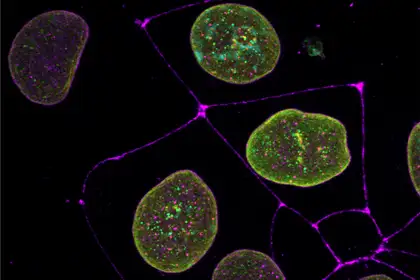
A cell nuclei, the subject of Dr Tracy Hale's research project.
The project, titled PIN1ing down heterochromatin to prevent cellular ageing, is led by Dr Tracy Hale, Dr Helen Fitzsimons, and Professor Bill Williams from the School of Natural Sciences.
It has been awarded $150,000 in funding across 24 months. Dr Hale says the research project aims to enable the development of a new molecular model of nuclear envelope function that will inform research in areas such as neurobiology and regenerative medicine. This is particularly relevant to New Zealand, with its ageing population that is expected to present a huge challenge to the health system.
“At the cellular level, ageing-related diseases are associated with dysfunction of the nuclear envelope, which weakens the integrity of the nucleus. Ultimately, this impaired cell function leads to ageing-related diseases such as cancer, and neurodegenerative diseases such as Alzheimer’s disease.”
For the project, the research team will look at the mechanisms through which the reduced integrity of a cell’s nuclear envelope contributes to cellular ageing. Dr Hale says, “The three-dimensional nucleus is defined by the nuclear envelope, within which DNA is packaged into chromatin. Despite this, the role that chromatin plays in the structural integrity of the nucleus has been largely ignored. We have shown that HP1α, an architectural protein that compacts chromatin, maintains chromatin at the nuclear envelope ensuring its integrity. By employing a multidisciplinary approach, we will identify the factors that regulate HP1α-dependent tethering and determine the mechanisms through which HP1α protects nuclear integrity.”
The 17 Explorer Grants awarded by the HRC are worth a combined total of $2.55 million. All the Explorer Grants have a focus on innovative and transformative research and are an example of cutting-edge, higher-risk investment.
Learn more about the Grants here.